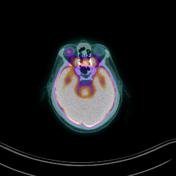11 juni 2014: dat ipilimumab bij melanomen een interessant middel is hebben verschillende studies bewezen, maar bij oogmelanoom lijkt dit niet het geval, zoals een kleinschalige gerandomiseerde studie uitwijst. Slechts 1 van de 24 deelnemers bereikte een gedeeltelijke remissie. 4 patiënten bereikten korte tijd stabiele ziekte. Bij alle andere was er geen sprake van een therapeutisch effect.
Echter de onderzoekers wijzen erop dat een receptorenonderzoek en DNA onderzoek wellicht die enkele patiënt die ervan zou kunnen profiteren uit kan halen. In deze studie zijn willekeurig 24 deelnemers onderzocht zonder vooraf een biomoleculair onderzoek begrijp ik uit de studieopzet. Is niet zo heel slim lijkt mij.

Het abstract van de studie: Long-term survival benefit from ipilimumab treatment in metastatic uveal melanoma patients is gepresenteerd op ASCO 2014 maar is bij mijn weten nog niet in een medisch tijdschrift gepubliceerd.
Long-term survival benefit from ipilimumab treatment in metastatic uveal melanoma patients.
Author(s): Mugdha Anand Deo; Universite Catholique de Louvain, Brussels, Belgium
Abstract:
Background: Uveal melanoma is the most common intraocular malignant tumor with an incidence of approximately 5 cases per million per year. Around 50% of the patients relapse after a curative-intended local treatment. Liver metastasis is the most common site of recurrence. The standard treatment is a systemic chemotherapy with an alkylating agent but does not show an overall survival benefit. In this study, we assessed the overall survival benefit from ipilimumab treatment in metastatic uveal melanoma (MUM) patients based on its success in improving overall survival in cutaneous melanoma patients.
Methods: A retrospective analysis was performed at the Cliniques Universitaires Saint-Luc to assess the long term survival benefit from ipilimumab treatment in previously treated MUM patients. The patients progressing after a first-line chemotherapy were sequentially included if their ECOG score was ≤ 2. They received 3mg/kg of ipilimumab every 3 weeks with the median cycle number of 3.92. Tumor response was assessed every 3 months using CT scan according to RECIST. Progression free survival (PFS), overall survival (OS) and objective response (OR) were calculated using Kaplan-Meier and median duration of follow-up was calculated by univariate analysis.
Results: Twenty-four previously treated MUM patients were included in this analysis. No OR was observed in 23 (96%) patients, while 1(4%) patient showed a late partial response after 9 months. Four (17%) patients showed a stable disease lasting ≥ 3 months. With a median follow-up of 7.3 months, the median PFS was 2.8 months. The median OS was 9.7 months and OS rates at 12 and 24 months were 45.6% and 11.4%, respectively.
Conclusions: Our findings confirm the very low response rate of ipilimumab in MUM patients. However, this drug has a clear benefit in increasing the overall survival for some patients than that obtained with standard chemotherapy. Most of the published data assessing the efficacy of ipilimumab in ocular melanoma are focused on response rate and median overall survival. We do think that looking at the survival rate at 1-2 years is more relevant to assess the efficacy of ipilimumab. How to select patients benefiting from ipilimumab remains a challenge.
Gerelateerde artikelen
- Ipilimumab plus Nivolumab samen gegeven geeft uitstekende resultaten bij melanomen stadium 3 / 4 op 2 jaars overleving en verdubbelt complete remissies in vergelijking met alleen ipilimumab
- ipilimumab geeft geen enkel effect bij een oogmelanoom
- Ipilimumab geeft hoopgevende resultaten op langere overleving bij patienten met een melanoom graad III en IV die al eerder intensief behandeld zijn.
- Ipilimumab - Yervoy blijkt veilige en effectieve behandeling bij beginnende nog niet behandelde patienten met een melanoom.



Plaats een reactie ...
Reageer op "ipilimumab geeft geen enkel effect bij een oogmelanoom"